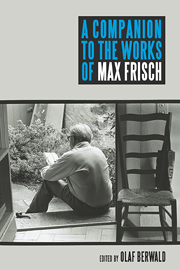Book contents
- Frontmatter
- Contents
- Acknowledgments
- Note on the Abbreviations
- Introduction: Max Frisch in the Twenty-First Century
- 1 Max Frisch's Early Plays
- 2 Spielraum in Max Frisch's Graf Öderland and Don Juan: Transparency as Mode of Performance
- 3 Max Frisch's Biedermann und die Brandstifter and Die große Wut des Philipp Hotz
- 4 Max Frisch's Andorra: Balancing Act between Pattern and Particular
- 5 Eternal Recurrence in Life and Death in Max Frisch's Late Plays
- 6 Max Frisch's Early Fiction
- 7 From Life to Literature: Max Frisch's Tagebücher
- 8 “Writing in order to be a stranger to oneself”: Max Frisch's Stiller
- 9 Cybernetic Flow, Analogy, and Probability in Max Frisch's Homo Faber
- 10 The Ends of Blindness in Max Frisch's Mein Name sei Gantenbein
- 11 Max Frisch's Montauk. Eine Erzählung
- 12 Man, Culture, and Nature in Max Frisch's Der Mensch erscheint im Holozän
- 13 “My life as a man. Everyman”: Max Frisch's Blaubart. Erzählung
- 14 Max Frisch's Essays and Speeches
- Frisch's Major Works
- Select Bibliography
- Notes on the Contributors
- Index
2 - Spielraum in Max Frisch's Graf Öderland and Don Juan: Transparency as Mode of Performance
Published online by Cambridge University Press: 05 December 2013
- Frontmatter
- Contents
- Acknowledgments
- Note on the Abbreviations
- Introduction: Max Frisch in the Twenty-First Century
- 1 Max Frisch's Early Plays
- 2 Spielraum in Max Frisch's Graf Öderland and Don Juan: Transparency as Mode of Performance
- 3 Max Frisch's Biedermann und die Brandstifter and Die große Wut des Philipp Hotz
- 4 Max Frisch's Andorra: Balancing Act between Pattern and Particular
- 5 Eternal Recurrence in Life and Death in Max Frisch's Late Plays
- 6 Max Frisch's Early Fiction
- 7 From Life to Literature: Max Frisch's Tagebücher
- 8 “Writing in order to be a stranger to oneself”: Max Frisch's Stiller
- 9 Cybernetic Flow, Analogy, and Probability in Max Frisch's Homo Faber
- 10 The Ends of Blindness in Max Frisch's Mein Name sei Gantenbein
- 11 Max Frisch's Montauk. Eine Erzählung
- 12 Man, Culture, and Nature in Max Frisch's Der Mensch erscheint im Holozän
- 13 “My life as a man. Everyman”: Max Frisch's Blaubart. Erzählung
- 14 Max Frisch's Essays and Speeches
- Frisch's Major Works
- Select Bibliography
- Notes on the Contributors
- Index
Summary
Frisch conceived his playsGraf Öderland (Count Oderland, first version 1951, later versions 1956 and 1961) and Don Juan oder Die Liebe zur Geometrie (Don Juan or The Love of Geometry, 1953, later version 1962) during a fascinating period of transformation in international theater in the 1950s. One component of this transformation was the presence of Jean Paul Sartre's existentialism, which painfully examines the roots of the human condition in the twentieth century, on the German stage. Another component was the showcase of the Berliner Ensemble, which staged Brecht's political vision of an alterable world, a showcase that transformed Brecht, in Frisch's own words, into a “Klassiker” whose approach needed to be modified. A third component framing Frisch's work was the success of absurdist writers such as Samuel Beckett, whose most famous works, Endgame and Waiting for Godot, portray the lack of motivation and the boredom in bureaucratic societies, themes that play a significant role in Graf Öderland. Unlike the stage successes of Sartre, Brecht, Beckett, and Ionesco, or even of Frisch's early plays, both Graf Öderland and Don Juan share the fate of being his first works to be rejected by theater audiences and critics alike, forcing him to rethink his approach within the context of the 1950s.
- Type
- Chapter
- Information
- A Companion to the Works of Max Frisch , pp. 23 - 38Publisher: Boydell & BrewerPrint publication year: 2013

